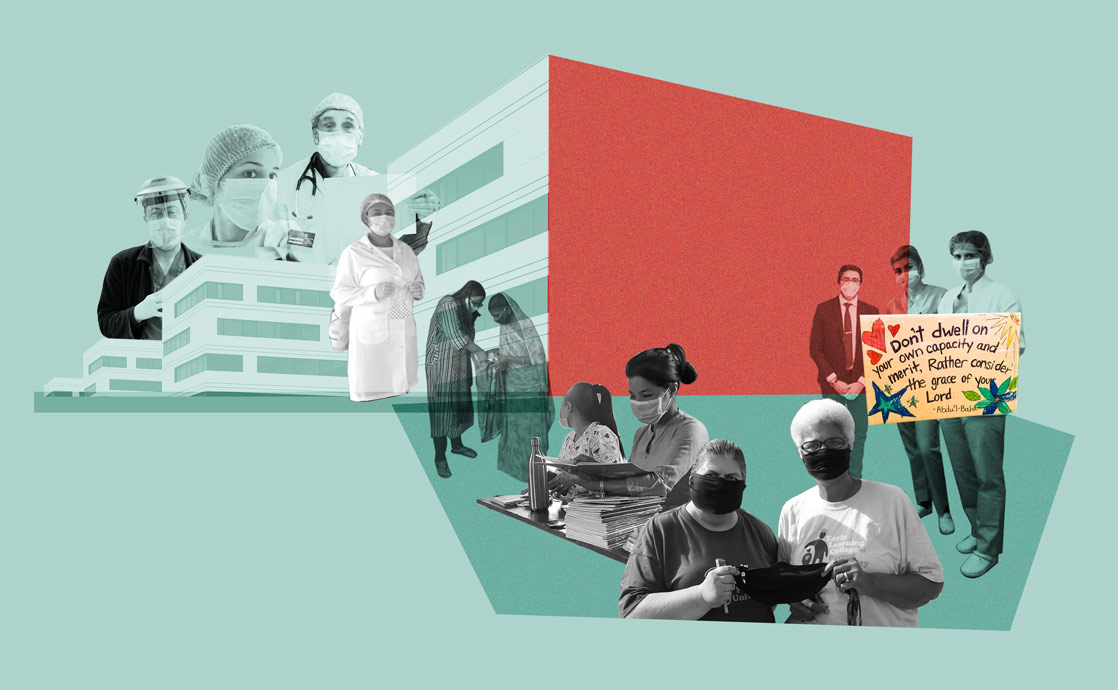In the face of unprecedented global disruptions imposed by the pandemic, the Bahá’í teachings provide a profound framework for understanding the distinctive role healthcare professionals can play within their communities. This role is multifaceted, intertwining public health imperatives with spiritual and moral obligations. Therefore, how can healthcare professionals embody the principles of unity, service, and collective well-being espoused by Bahá’í doctrines in these trying times?
The pandemic has illuminated critical deficiencies in healthcare systems and community cohesion. As societies grapple with the escalating challenges of disease transmission and mental health crises, it becomes imperative to question: How can the holistic approach advocated by Bahá’í teachings foster communal resilience? Healthcare professionals stand at the intersection of medical expertise and community engagement, equipped to address not only the physical but also the psychological and spiritual well-being of individuals.
Firstly, the Bahá’í principle of the oneness of humanity suggests that healthcare professionals must cultivate an inclusive environment where respect for diversity prevails. This is particularly salient in pandemic scenarios where marginalized communities often bear the brunt of systemic inequalities. Approaching healthcare delivery through the lens of equity ensures that care is accessible and tailored to meet the unique needs of diverse populations. This may involve conducting outreach programs in various languages, employing culturally competent practices, and engaging local leaders to foster trust and participation.
The idea of service to humanity is paramount within Bahá’í thought. Healthcare professionals are not merely providers of medical care but also serve as advocates and educators within their communities. In times of crisis, their responsibility expands beyond the confines of hospitals and clinics to encompass preventive measures and health education initiatives. For instance, they can organize workshops that elucidate safety protocols, mental health resources, and the importance of vaccination. Such initiatives resonate with the Bahá’í commitment to the betterment of society, reinforcing the notion that individual health is inextricably linked to community wellness.
The pandemic has also revealed the necessity for collaborative efforts in healthcare response. One of the fundamental teachings of the Bahá’í Faith is the power of collective action. Healthcare professionals can spearhead multidisciplinary collaborations that bring together various stakeholders—government bodies, non-governmental organizations, and community members—to synergistically address public health challenges. These partnerships can lead to innovative solutions that enhance resource allocation and health outcomes, embodying the spirit of consultation central to Bahá’í practice.
Moreover, the integration of spiritual health alongside physical health underscores the holistic view championed by Bahá’í teachings. The pandemic has precipitated an array of mental health challenges, necessitating a more comprehensive approach to care delivery. Healthcare professionals are called to acknowledge the significance of spiritual well-being, which impacts cognitive and emotional states. Implementing programs that offer psychological support, meditation, or spiritual counseling can serve as vital adjuncts to conventional medical interventions, highlighting the interconnectedness of body, mind, and spirit.
Yet, amid these efforts, healthcare professionals may encounter several challenges. The rapid evolution of public health information can lead to confusion and misinformation, undermining public trust. As they strive to communicate effectively, how can they combat the noise and present information that aligns with ethical standards and scientific integrity? Upholding transparency in communication, engaging in dialogue with community members, and cultivating an environment of trust can mitigate these challenges. By embodying humility and openness, healthcare professionals can reinforce the Bahá’í ideal of collective learning and progress.
Another challenge lies in the emotional toll experienced by healthcare workers during extended periods of crisis. The Bahá’í emphasis on the importance of community support can play a pivotal role in this context. Healthcare professionals can actively seek and provide mutual support networks that facilitate emotional resilience. Establishing peer support groups, mental health days, and gratitude practices can cultivate an environment in which professionals feel empowered and valued. It elucidates the Bahá’í teaching that community is not only a source of strength but also a safeguard against despair.
The enduring nature of the pandemic prompts a critical reflection on the future trajectory of healthcare practice. How can the lessons learned during these tumultuous times shape a more responsive and compassionate healthcare system moving forward? The Bahá’í teachings advocate for continuous learning and adaptation, prompting healthcare professionals to engage in ongoing training and reflection. This necessitates an unwavering commitment to emerging best practices, technological advancements, and evolving community needs. Such adaptability will fortify the healthcare system against future adversities, ensuring a more sustainable and inclusive model of care.
In conclusion, the distinctive role that healthcare professionals can assume during the pandemic, rooted in Bahá’í teachings, underscores the interdependence of community and individual well-being. By fostering inclusivity, advocating for equitable care, engaging in collaborative efforts, and prioritizing holistic health, professionals can embody the essence of service to humanity. As we navigate the complexities of public health crises, let us cultivate a spirit of unity and resilience, paving the way for a healthier, more compassionate world. It invites us to ponder: What actions can we collectively take today to manifest the ideals of a better tomorrow?
